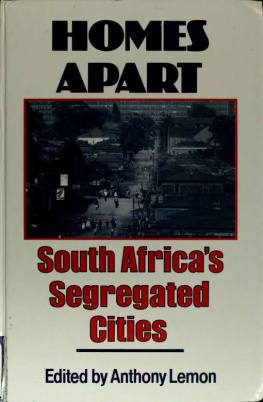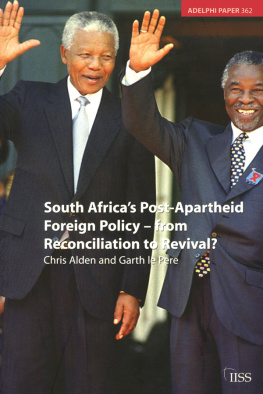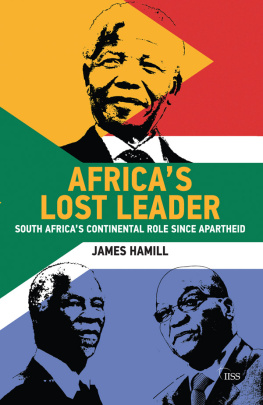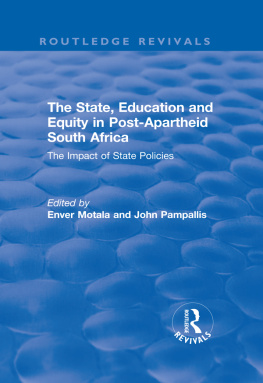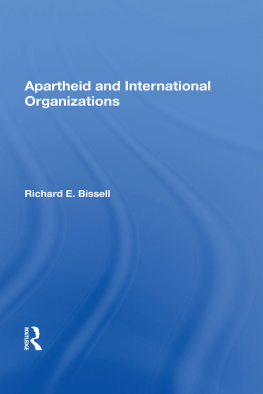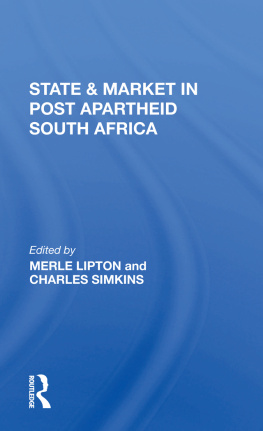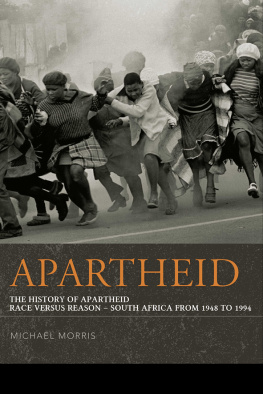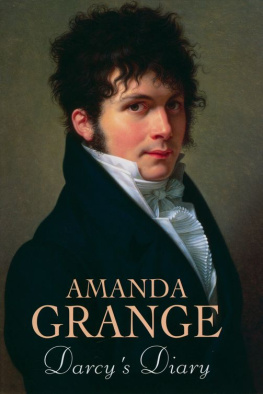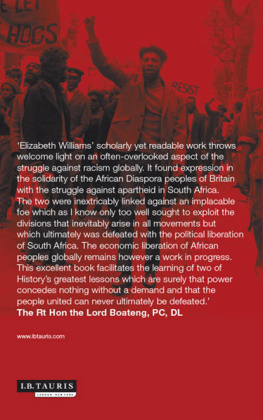This book made available by the Internet Archive.
12. Windhoek 174 David Simon
13. Harare: a window on the future for the South African City? 191 Neil Dewar
14. Towards the Post-Apartheid City 205 Anthony Lemon
References 215
A cts of Parliament 229
Index 231
Anthony J. Christopher is Professor and Head of the Department of Geography at the University of Port Elizabeth. He has published six books and numerous articles in international journals on the historical and political geography of southern Africa, Africa and the British Commonwealth. He has recently made a special study of levels of urban segregation in South Africa.
Gillian P. Cook gained her doctorate at the University of Chicago and has lectured at Rhodes University, Grahamstown, South Africa and Cape Town. Her publications are mainly concerned with South African urban and settlement geography, and she is also interested in gender issues in geography. She is currently a Visiting Fellow at Southampton University.
Ron Davies is Professor of Geography, University of Cape Town, and was formerly Professor of Geography at the University of Natal, Durban. He has long been a student of the South African city, and in particular of the Durban metropolitan area.
Neil Dewar is a senior lecturer in Geography at the University of Cape Town. He holds Masters degrees in both geography and urban and regional planning, and was awarded his doctorate for a thesis on the changing geography of public finance from Salisbury to Harare.
James Drummond studied at the University of Glasgow and obtained his MA degree in 1984. Since then he has lectured at the University of Bophuthatswana in Mmabatho, South Africa, whilst pursuing part-time postgraduate research at the University of the Witwatersrand, Johannesburg.
Roddy Fox is a graduate of Strathclyde University, and spent several years lecturing at the University of Kenya in Nairobi before moving to his present lectureship in the Department of Geography at Rhodes University, Grahams-town, South Africa. He has published mainly on the urban and settlement geography of East Africa, but has now extended his research to South Africa.
Phillip S. Hattingh is Professor of Geography and Head of Department at the University of Pretoria. His research, spanning more than two decades, has
mainly concerned black South Africans: the 'homelands', population and urbanization issues, recreation and also the spatial implications of public decision-making, policy formulation and execution.
Andre C. Horn is a lecturer in Geography at the University of Pretoria. His interests include urban geography, behavioural and humanistic geography. His current research focuses on the structural and human ecology of South African cities and its impact on human well-being.
D. S. (Skip) Krige is a senior lecturer in Political Geography at the University of the Orange Free State in Bloemfontein. He studied at the Universities of Stellenbosch, Oxford and the Orange Free State. His research interests are in political geography, the impact of apartheid planning, housing and informal settlements, and the transformation of South African cities.
Etienne Nel is a lecturer in Geography at Rhodes University, Grahamstown, South Africa, where he also graduated. He has previously been employed by the Natal Education Department, the University of Transkei and the Giyani College of Education in Gazankulu. He has recently completed a Masters thesis on racial residential segregation in East London.
Susan Parnell is a lecturer in the Department of Geography at the University of the Witwatersrand. She has published numerous papers on the historical and contemporary geography of South African cities, especially Johannesburg.
Gordon Pirie is a lecturer in Human Geography at the University of the Witwatersrand, Johannesburg. He has published extensively on the historical, urban and transportation geography of South Africa, and was awarded his doctorate for an historical study of racial discrimination in South African passenger transport.
Claudia M. Reintges is a lecturer in Geography at Rhodes University, Grahams-town, South Africa. Her research interests are mainly concerned with South African urbanization, especially the future of peri-urban settlements and forms of the local state in urban and rural areas.
David Simon lectures in Development Studies and Geography at Royal Holloway and Bedford New College, University of London. He is co-author of The British Transport Industry and the European Community (Gower, 1987), editor of Third World Regional Development: a Reappraisal (Paul Chapman, 1990), and has published extensively on transport, urbanization, planning and development issues. His Third World research interests have focused primarily on southern Africa, and especially Namibia.
Trevor M. Wills is a senior lecturer in Geography at the University of Natal, Pietermaritzburg, his home city in which he has developed a close interest. He is an urban geographer whose research has included involvement in planning projects in both the city of Pietermaritzburg and the province of Natal.
PREFACE
Already some three-fifths of all South Africans live in cities, and the proportion who do so will undoubtedly continue to increase in the post-apartheid era. The new urbanities will be overwhelmingly black, but they will come to cities which have been designed by, and primarily for, white people whose dominance in the social formation has been reflected in the colonial, segregation, and apartheid cities which they have successively created. Of these, the apartheid city was, like the wider society to which it belongs, the most deliberate creation. The extraordinary recasting which it represents reflects the Afrikaner Nationalist urge 'to be the architect and engineer of its own fundamentals' (de Klerk, 1975, p. 339).
As the end of the apartheid era approaches, South African cities are already undergoing rapid changes in response to multiple and growing pressures. Some of these pressures have already been the subject of legislative and policy changes, and others will be soon. In most cases such changes constitute a belated adjustment to what is already happening on the ground, often combined with new attempts to control and guide it.
Before very long, a new government representing the black majority will be faced with the formidable problems of South Africa's cities, combining as they do the planning problems of both First World and Third World urbanism and the huge headaches of an apartheid inheritance. Will the new authorities seek to restructure the cities as fundamentally as their predecessors? The enormity of such a task, after four decades of urban growth, would alone render such a task impossible. But changes there will clearly be, as the attempt is made to erase the human miseries of the apartheid city and to plan for the welfare of all urban dwellers instead of a dominant minority.

